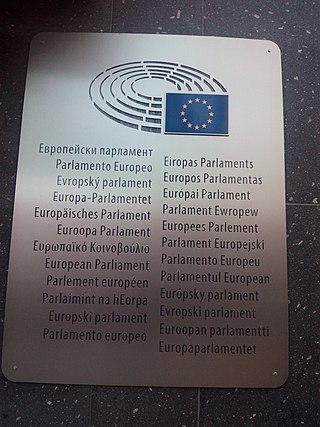
Esperanto is the world's most widely spoken constructed international auxiliary language. Created by L. L. Zamenhof in 1887, it is intended to be a universal second language for international communication, or "the international language". Zamenhof first described the language in Dr. Esperanto's International Language, which he published under the pseudonym Doktoro Esperanto. Early adopters of the language liked the name Esperanto and soon used it to describe his language. The word esperanto translates into English as "one who hopes".

Esperantujo or Esperantio is the community of speakers of the Esperanto language and their culture, as well as the places and institutions where the language is used. The term is used "as if it were a country."

L. L. Zamenhof developed Esperanto in the 1870s and '80s. Unua Libro, the first print discussion of the language, appeared in 1887. The number of Esperanto speakers have increased gradually since then, without much support from governments and international organizations. Its use has, in some instances, been outlawed or otherwise suppressed.
International English is the concept of using the English language as a global means of communication similar to an international auxiliary language, and often refers to the movement towards an international standard for the language. Related and sometimes synonymous terms include: Global English, World English, Common English, Continental English, General English, and Engas. Sometimes, these terms refer to the actuality of the situation, where English is spoken and used in numerous dialects around the world. These terms may acknowledge the diversity and varieties of English spoken throughout the world.

Interlingua is an international auxiliary language (IAL) developed between 1937 and 1951 by the American International Auxiliary Language Association (IALA). It is a constructed language of the "naturalistic" variety, whose vocabulary, grammar, and other characteristics are derived from natural languages. Interlingua literature maintains that (written) Interlingua is comprehensible to the billions of people who speak Romance languages, though it is actively spoken by only a few hundred.
An international auxiliary language is a language meant for communication between people from all different nations, who do not share a common first language. An auxiliary language is primarily a foreign language and often a constructed language. The concept is related to but separate from the idea of a lingua franca that people must use to communicate. The study of international auxiliary languages is interlinguistics.
A lingua franca (; lit. 'Frankish tongue'; for plurals see § Usage notes), also known as a bridge language, common language, trade language, auxiliary language, link language or language of wider communication (LWC), is a language systematically used to make communication possible between groups of people who do not share a native language or dialect, particularly when it is a third language that is distinct from both of the speakers' native languages.
Europanto is a macaronic language concept with a fluid vocabulary from European languages of the user's choice or need. It was conceived in 1996 by Diego Marani based on the common practice of word-borrowing usage of many European languages. Marani used it in response to the perceived dominance of the English language; it is an emulation of the effect that non-native speakers struggling to learn a language typically add words and phrases from their native language to express their meanings clearly.
Vernacular is the ordinary, informal, spoken form of language, particularly when perceived as having lower social status or less prestige in contrast to standard language, which is more codified, institutionally promoted, literary, or formal. More narrowly, a particular language variety that does not hold a widespread high-status perception, and sometimes even carries social stigma, is also called a vernacular, vernacular dialect, nonstandard dialect, etc. and is typically its speakers' native variety. Regardless of any such stigma, modern linguistics regards all nonstandard dialects as full-fledged varieties of language with their own consistent grammatical structure, sound system, body of vocabulary, etc.

The European Union (EU) has 24 official languages, of which three – English, French and German – were considered "procedural" languages but this notion was abandoned by the European Commission. In fact English and French are used in the day-to-day workings of the institutions of the EU. Institutions have the right to define the linguistic regime of their working but the Commission and a number of other institutions did not do this as indicated by several Court judgments

Sennacieca Asocio Tutmonda is an independent worldwide cultural Esperanto association of a general left-wing orientation. Its headquarters are in Paris. According to Jacques Schram, chairman of the Executive Committee, the membership totalled 881 in 2003. In 2006 SAT had 724 members. In 2015-2016 there were 525.
Interlinguistics, also known as cosmoglottics, is the science of planned languages as it has existed for more than a century. Formalised by Otto Jespersen in 1931 as the science of interlanguages, in more recent times, the field has been more focused with language planning, the collection of strategies to deliberately influence the structure and function of a living language. In this framework, interlanguages become a subset of planned languages, i.e. extreme cases of language planning.

The Declaration on the Essence of Esperantism, commonly referred to as the Declaration of Boulogne, is a historic document that establishes several important premises for the Esperanto movement. The Declaration was written by L. L. Zamenhof and ratified in 1905 by the attendees of the first World Esperanto Congress, held in Boulogne-sur-Mer, France.

Europe–Democracy–Esperanto is an electoral list, which participates in the European elections. The party's main platform is the introduction of Esperanto as the official language of the European Union (EU) in order to make international communication more efficient and fair in economical and philosophical terms, based on the conclusions of a report by François Grin.

The Mediterranean Lingua Franca, or Sabir, was a contact language, or languages, that were used as a lingua franca in the Mediterranean Basin from the 11th to the 19th centuries. April McMahon describes Sabir as a "fifteenth century proto-pidgin" and "a relic of the original Lingua Franca, a medieval language used by Mediterranean traders and by the Crusaders." Operstein and McMahon categorize Sabir and "Lingua Franca" as separate but related languages.
English as a lingua franca (ELF) is the use of the English language "as a global means of inter-community communication" and can be understood as "any use of English among speakers of different first languages for whom English is the communicative medium of choice and often the only option". ELF is "defined functionally by its use in intercultural communication rather than formally by its reference to native-speaker norms" whereas English as a second or foreign language aims at meeting native speaker norms and gives prominence to native-speaker cultural aspects. While lingua francas have been used for centuries, what makes ELF a novel phenomenon is the extent to which it is used in spoken, written and computer-mediated communication. ELF research focuses on the pragmatics of variation which is manifest in the variable use of the resources of English for a wide range of globalized purposes, in important formal encounters such as business transactions, international diplomacy and conflict resolution, as well as in informal exchanges between international friends.

A constructed language is a language whose phonology, grammar, orthography, and vocabulary, instead of having developed naturally, are consciously devised for some purpose, which may include being devised for a work of fiction. A constructed language may also be referred to as an artificial, planned or invented language, or a fictional language. Planned languages are languages that have been purposefully designed; they are the result of deliberate, controlling intervention and are thus of a form of language planning.
François Grin is a Swiss economist. One of his research fields is the economics of language.

A pan-Romance language or Romance interlanguage is a codified linguistic variety which synthesizes the variation of the Romance languages and is representative of these as a whole. It can be seen as a standard language proposal for the whole language family but is generally considered a zonal constructed language because it's the result of intense codification. Zonal languages are, according to interlinguist Detlev Blanke, constructed languages which "arise by choosing or mixing linguistic elements in a language group".











